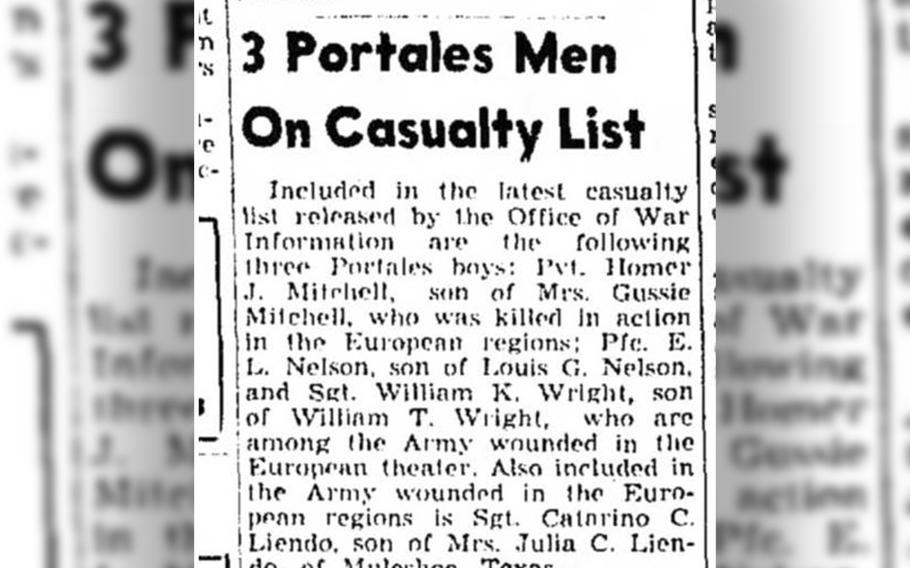
An undated file photo shows Army Pvt. Homer J. Mitchell of Portales, N.M., at age 20. Mitchell was killed in Germany during World War II, and his remains were identified by the Defense POW/MIA Accounting Agency in July. (DPAA)
A New Mexico soldier killed 79 years ago in a German forest during World War II will be buried in his hometown this spring after a multiyear effort to identify his remains, the Defense Department said.
Army Pvt. Homer J. Mitchell, who was 20 when he died, was successfully accounted for in July, the Defense POW/MIA Accounting Agency said in a Dec. 18 statement.
A resident of Portales, N.M., Mitchell served with the 359th Infantry Regiment, 90th Infantry Division. He was killed in the Pachten Forest near the town of Dillingen, roughly 20 miles northwest of Saarbruecken.
In the aftermath of the Allied victory, the American Graves Registration Command was tasked with investigating and recovering missing American personnel in Europe.
“They conducted several investigations in the Pachten Forest area between 1946 and 1950 but were unable to recover or identify Mitchell’s remains. He was officially declared killed in action in November 1951,” the DPAA statement said.

Army Pvt. Homer J. Mitchell of Portales, N.M., was killed in Germany's Pachten Forest during World War II. He was accounted for by the Defense POW/MIA Accounting Agency in July. (DPAA)
In 2018, a DPAA historian discovered what would turn out to be Mitchell’s remains while studying unresolved American losses connected to the fighting in the Pachten Forest area.
The DPAA determined that one set of unidentified remains, recovered in February 1946 from that area, may be those of Mitchell.
The remains had been interred in the United States Military Cemetery, now called Brittany American Cemetery, in 1950, DPAA said. In 2021, the remains were disinterred for analysis.
Mitchell’s name is on the Walls of the Missing at Lorraine American Cemetery, an American Battle Monuments Commission site in St. Avold, France, along with the others still missing from World War II.
Now, a rosette will be placed next to his name to indicate that he has been accounted for, DPAA said. Mitchell will be buried in Portales on April 26, 2024.
His battalion had been tasked with holding a defensive position against the Germans. He was reported killed in action on Dec. 10 by enemy artillery fire, but the intensity of the fighting prevented evacuation of his body.
“American commanders eventually ordered the regiment to withdraw, but many casualties were nonrecoverable,” the statement said.
The DPAA has worked for many decades to recover U.S. troops lost in Europe during World War II. The group often collaborates with German researchers in those efforts.
In 2015, the Defense POW/MIA Accounting Agency opened a detachment in Germany to facilitate its investigations.